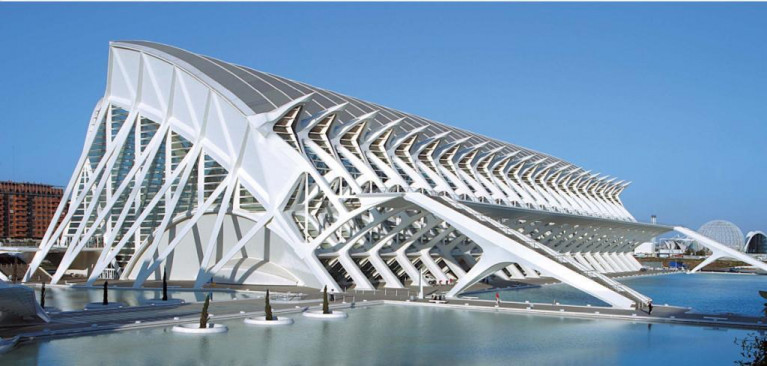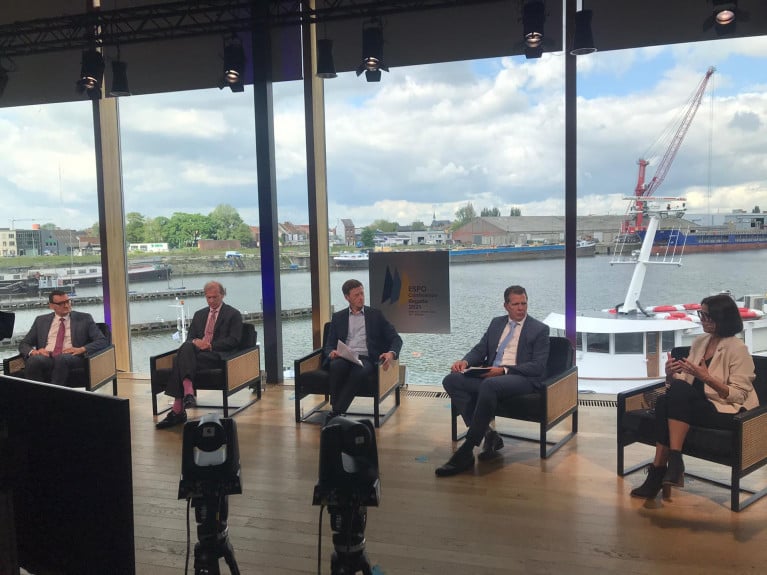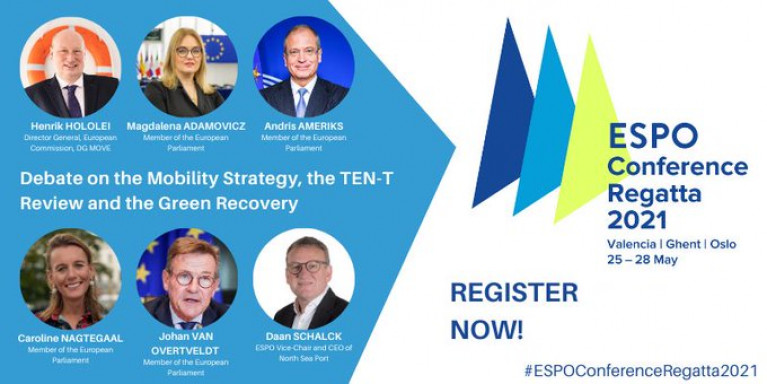Displaying items by tag: ESPO Conference
Priorities of Europe’s Seaports for 2024-2029 (ESPO) Highlights in Advance of Forthcoming EU Elections
The European Sea Ports Organisation (ESPO) has set out its priorities for the next five years in view of the forthcoming EU elections to be held in May.
EPSO represents the port authorities, port associations and port administrations of the seaports of 21 Member States of the European Union and Norway at EU political level. ESPO also has observer members in Albania, Iceland, Israel, Montenegro, Ukraine and the United Kingdom.
As the world is in transition, so too are ports in transition. More than ever, ports are strategic entities and enablers of Europe’s ambitions and its sustainable, digital, competitive, strong and social future. Ports want to be part of the solution and are taking up new responsabilities on top of their traditional role as multimodal hub in the supply chain.
Entitled “a net-zero, smart, resilient and competitive Europe: Europe’s ports are part of the solution”, ESPO’s memorandum outlines nine priorities:
1. Focus on implementation: Europe’s ports ask policymakers to provide clarity and support to ports to ensure the effective implementation of existing regulations. In this context, incoherences or conflicting policies should be addressed.
2. Give ports the space to take up their role as facilitator of renewable energy. The energy transition will require space in ports; Permitting barriers should be removed; Ports should be actively considered when relevant energy policies, circular economy and carbon strategies are being developed; Riskier pioneering energy investments should be financially supported.
3. Reducing emissions and pollution is an important KPI for ports: Ports in Europe want an agreement on a well-defined global maritime GHG emission pricing mechanism; ports should be allowed to prioritise green investments where it makes most sense in terms of emission reduction; a continuous dialogue with stakeholders is needed to avoid stranded assets; the new 90% GHG emission reduction target must be seen as a stepping stone towards 2050.
4. The level playing field both within the internal market and vis-à-vis Europe’s neighbours must be safeguarded: Ports plead for a “do not harm competitiveness check” in EU policy making; equal access and conditions to funding is key, diverging national approaches should be avoided; boosting net-zero industries implies reinforcing the relevant supply chains; the fair power play and level playing field within the maritime sector should be monitored closely.
5. Ports are pivotal in strengthening Europe’s resilience: Ports are an important pillar of Europe’s supply chain sovereignty; ports are in favour of a more harmonised approach to address foreign influence in ports; Europe must however remain an attractive place to invest; EU security measures should not stop trade, but make it safer.
6. Ports are partners in striving for a smart, but safe and secure cyber environment: Digitalisation and smart technologies are crucial tools in making Europe’s ports more efficient, safe and sustainable; additional measures to step up cybersecurity and further digitalisation might be needed; raising awareness of possible cyber risks is a shared responsibility among all port stakeholders.
7. Europe’s ports require 80 billion investment needs for the next 10 years: Ports more than ever need access to a robust funding support instrument, with dedicated port envelopes, to invest in projects with high societal value but an often slow, low and risky return on investment; European funding should be simple;
8. The EU institutional structure should be adapted to the new reality: A more integrated approach is needed when developing new policies: transport, and in particular ports, cannot be discussed in isolation; a closer cooperation between Commission DGs is needed; a continuous, transparent and open dialogue between stakeholders and EU policy makers is needed to tackle the complexity of today’s challenges.
9. Ports are a resource for the city: Their new roles can open doors for attracting new businesses and talents to the port and port cities; effective cooperation between all stakeholders is needed to attract people to the port, since ports cannot do the job without the right people.
The priorities of Europe’s ports will be further discussed during the annual ESPO Conference this week: 25-26 April in Paris. If you would like to join these discussions, book now and secure one of the last tickets for this annual highlight of the European port industry.
Stronger than Ever as 'EcoPorts' Congratulated at European Sea Ports Organisation (ESPO) Conference
On the first day of the European Sea Ports Organisation (ESPO Conference held in Bremen, Germany today, the organisation congratulated the ports listed below for being certified through the EcoPorts’ environmental management standard (PERS).
Pers Ports: Grand Port Maritime de Dunkerque (France), Volos Port Authority (Greece), Port of Den Helder (the Netherlands), Autoridad Portuaria de Castellón (Spain), Autoridad Portuaria de Melilla (Spain), Santander Port Authority (Spain), Peterhead Port Authority (United Kingdom), Shoreham Port Authority (United Kingdom) and Asyaport Liman (Turkey).
Isabelle Ryckbost, ESPO Secretary General, Zeno D’Agostino, ESPO Chair, and Valter Selén, EcoPorts Coordinator, announced the PERS-certified ports during the annual ESPO Conference in Bremen.
Isabelle Ryckbost, ESPO Secretary General, commented: “It is great to see so many ports getting the PERS certification, either for the first time or getting a new certification. We know it takes an effort for ports to go through the process. We must not forget that considering the challenges ahead, the green agenda of ports is full. It is very rewarding to see that ports continue to do it and newcomers are joining.”
Valter Selén, ESPO Senior Policy Advisor and EcoPorts Coordinator, said: “The EcoPorts Network goes from strength to strength, with a growing number of ports joining the Network and becoming PERS-certified as part of their greening efforts. EcoPorts provides Europe’s ports with a means to demonstrate commitment to environmental management, and remains uniquely successful as a port-driven initiative on the European level. The recent PERS certification of 9 ports and the review of the SDM is testament to the continued relevance of the Network to ports in Europe.”
PERS (Port Environmental Review System) is the only port-specific environmental standard. The last five years have seen important increases in its recognition and membership, with 103 ports from 24 countries currently counting themselves as part of the EcoPorts Network, and 31 ports holding PERS certification. Compliance with the EcoPorts’ PERS standard is independently assessed by LRQA Nederland B.V. and the certificate has a validity of two years. EcoPorts’ PERS is revised after the 2-year period to make sure that the port continues to meet the requirements.
Reviewed Self-Diagnosis Method (SDM) further strengthens EcoPorts as the foremost environmental management tool for the port sector
The ESPO secretariat and the EcoPorts science coordinators have been reviewing the Self-Diagnosis Method (SDM). The SDM is a checklist that allows the port to identify and reflect on environmental risks, providing a snapshot of the environmental management efforts in the port. It includes all key indicators relevant to port environmental work, and a completed SDM is valid for a period of two years.
The SDM is usually reviewed every two to three years to account for new developments in port environmental management and sustainability. The exercise is intended to ensure the relevance and usefulness of the SDM as the entry point into the EcoPorts Network.
The updated SDM maintains the setup of the previous version, and remains in line with the international scope of EcoPorts. It strikes a careful balance between updating and renewing the SDM, and the ease of use of the SDM tool.
This latest review has seen the simplification, clarification and refinement of the SDM questionnaire. Key new indicators include whether the port has a roadmap for greening, whether the port monitors ambient and underwater noise, the possibility to allow battery charging and battery swapping in the port, agreements on the use of onshore power supply in ports, demand for alternative fuels, and the operational resilience of ports.
The reviewed SDM will ensure that the EcoPorts Network maintains its position as the foremost environmental management tool developed by ports, for ports.
For more information on EcoPorts’ PERS and SDM, click here.
ESPO Annual Conference (Bremen,1-2 June): Europe’s Ports as Partners in Race towards Net-Zero Future
The European Sea Ports Organisation (ESPO) and its members are gathering for the 19th edition of the ESPO annual Conference to be held in Bremen between 1 and 2 June.
The conference is hosted by bremenports, one of the most important all-round ports in Europe, working with almost every type of cargo.
As Afloat previously reported on the conference, it is now that details of the event programme, registration process can be found on the conference website, noting the closing date for registration is 26th May.
The different crises Europe has been facing over the last few years are turning our economy and society upside down, without precedent. On top of the climate crisis, the new geopolitical context triggered by the Russian invasion in Ukraine, the connected energy crisis as well as the inflation and the crunch on the labour market are major headwinds, which directly affect Europe’s ports. Being at the crossroads of supply chains, hubs of energy, cluster of industries and nodes of connectivity and cohesion, ports in Europe are in the middle of this turbulent economic, energy and geopolitical landscape. It is not anymore just the economy, it is energy that rules the waves.
Entitled “Europe’s ports as partners in the race towards a net-zero future”, the conference will mainly discuss how to move forward. Whereas the pathway might differ from port to port, all ports in Europe want to contribute and be a partner in building a sustainable, resilient and competitive net-zero future for Europe.
But how to plan and prepare for the future when the tectonic plates are moving constantly? Seneca said: “If one does not know to which port one is sailing, no wind is favourable”. So, it is time to sit together and try to define the story of the future.
On day one of the conference, we will start with an economic and energy outlook, and will discuss the impact of all these game changers on supply chains and port operations. What will be the impact of the green transition on cargo flows? How will the energy and net zero industry impact Europe’s ports? Are the US IRA and the EU’s Green Deal Industrial plan reshaping the global trade? Are we heading towards a geopolitisation of trade? Is the outlook different for different parts of Europe?
Having broadened our lens during the morning of the first day, our ESPO Pop Up Port Academy in the afternoon of day one will seek answers on three concrete questions: How can ports plan for the future in an ever-changing world? Who will be “fueling” the future ports? What is the role of ports in fueling the future? Since tackling these never seen challenges imply important investments in ports, we will also be discussing the different funding possibilities in the afternoon of day one.
On day two of the conference, we kick off with a debate about cooperation. Is the green transition bringing the stakeholders closer or dividing them?
Our eye opener session will look at the specific case of the energy islands, whose ports are getting a new role.
As always, in the final part of our conference we will be talking politics. How to keep pace with the numerous legislative packages and measures Europe is preparing to face these crises (Fit for 55, REPower EU, the Green Deal Industrial Plan). How do policy makers see ports evolving and what can Europe do for its ports?
Different keynotes on where Europe and its Transport Networks stand will be followed by a final big debate with top EU decision makers.
But ESPO Conferences are more than just a conference. Also, this year networking will be high on the agenda. The setting of the splendid heritage listed Park Hotel in the middle of a magnificent Bürgerpark combined with the gala dinner in Bremen’s beautiful historic city hall will no doubt facilitate talks among ports and their stakeholders, between ports and decision makers.
The conference will be followed by a boat visit to the Port of Bremen.
Together with our host, bremenports, we are putting everything in place to make this again a unique edition of this annual highlight for the European port community.
European Sea Ports Organisation Conference 2022 Heads to Valencia, Spain - Get Ready to Register!
The Annual Conference of the European Sea Port Organisation (ESPO) is heading to the Port of Valencia, Spain where the theme of this 18th edition of the conference is “Empowering Europe’s ports”.
The two day conference takes place on 2 and 3 June and will take place at the Príncipe Felipe Science Museum.
Europe’s ports are no longer operating in a societal, commercial, and geopolitical safe and stable environment as we have known during the last decades.
The global health crisis we went through over the last two years and the war in Ukraine we are experiencing at the moment require ports to be agile and resilient at all times. At the same time, challenged by the upcoming multipolar world, Europe is trying to achieve strategic autonomy, thereby safeguarding a stable trade and economic environment and ensuring the security of supply of critical raw materials and goods.
With realities changing overnight, it becomes increasingly difficult to make long-term investment plans and strategies. This disruptive societal, commercial, and geopolitical environment comes also at a time where ports are setting course to realise Europe’s ambition and prepare for a carbon-neutral and digitally smart future.
How can ports prepare today for the world of tomorrow? Which role are Europe’s ports to play in the supply chains of tomorrow? How will the trade patterns evolve? How will the new energy landscape impact port infrastructure and spatial planning? Is the current energy crisis a catalysator of the green transition or a game stopper? In short, how to empower Europe’s ports and how can ports empower Europe’s economy and society?
These are some of the questions to be addressed at the forthcoming ESPO Conference. As usual, the Conference will feature a series of top speakers and experts, but will also offer an excellent platform for discussions and exchanges between port professionals, port stakeholders, academics, and EU policy makers.
After more than two years, there is a strong need to catch up among port professionals and friends. A breakout session at the end of day one, as well as the usual conference dinner on 2 June will offer excellent opportunities for networking. The ESPO Conference as well as the conference dinner will take place in the heart of the unique Ciutat de les Arts i les Ciències.
Reasons enough to already clear your agenda now for 2 and 3 June for this annual highlight of the European port industry and keep a close eye on your mailbox since registrations and the full programme will be available very soon.
If you want to be sure not to miss this, drop us a message expressing your interest at [email protected] and we will contact you personally when it is time to book!
In the upcoming review of TEN-T guidelines, they have been one of the central topics during the first two days of the European Sea Ports Organisation (ESPO) Conference Regatta 2021.
European Transport Commissioner Adina Vălean, Motorways of the Sea (MoS) Coordinator Prof. Kurt Bodewig, Members of the European Parliament and port representatives presented and discussed their views and expectations of the upcoming review of Europe’s transport infrastructure policy.
“During the discussions with EU policy makers we have seen a clear recognition of the role of Europe’s seaports and a clear understanding that this should be translated in a policy that strengthens both the sustainability and resilience of the maritime and port sector, while addressing the needs in basic infrastructure and port connectivity. This very much aligns with our ESPO position where we call for a level playing field of the land-based and the maritime dimension of Europe’s transport network and for a recognition of the strategic and diverse role of ports. As gateways to the world, being at the crossroads of supply chains, as hubs of energy, industry and blue economy, ports can substantially contribute to a sustainable, digital and resilient European recovery,” says ESPO’s Secretary General Isabelle Ryckbost.
In her opening address to the ESPO Conference Regatta, European Transport Commissioner Vălean said: “Our ambition is to better integrate maritime links in the TEN-T as part of the logistic chain for obvious reasons related to decarbonisation and efficiency. In addition, we want to better connect maritime links of the core network with rail freight corridors and better integrate the Motorways of the Sea programme within the TEN-T policy.”
During his intervention, Motorways of the Sea Coordinator Prof. Bodewig approached the MoS concept as a sustainable, smart and seamless European Maritime Space, but acknowledged that in addition to these three pillars, resilience will play a central role for the European transport system. Increased resilience of the overall transport system requires a stronger maritime dimension, including more and new maritime connections, as well as the development of port infrastructure.
“A strong and resilient maritime sector is key to ensure a sustainable development and competitiveness of the European economy. I strongly advocate investments in fleet renewals, alternative fuels and last-mile connections to the TEN-T,” remarked the MoS Coordinator Prof. Bodewig.
Motorways of the Sea (MoS) Coordinator Prof. Bodewig during the ESPO Conference Regatta 2021
In his key note speech, EIB Vice President Kris Peeters emphasised: “We should still invest in basic infrastructure, but it is important to consider the value for the supply chains.”
In the lead-up to the Conference Regatta, the European Sea Ports Organisation had adopted a joint position on the TEN-T revision (enclosed), focusing on the following 11 points:
- The changing role of ports
- Basic infrastructure needs remain, but additional diverse infrastructure needs come on top
- The main goals of EU transport infrastructure policy
- A strong maritime dimension: levelling the playing field
- Greening the TEN-T network
- Adjustment of the network
- Ports as strategic nodes
- Last-mile a first priority
- European seaports are critical for a resilient transport system
- Enhancing the digitalisation of the port ecosystem
- Policy coherence and synergies
The full position can be found here.
Time is fast approaching for the European Sea Ports Organisation Conference which is to be held between 25-28 May.
The event will be the European port industry's gathering and as the 17th edition of the ESPO Conference.
This year, ESPO, however will take you on a trip through Europe without you leaving your seat!
The Conference Regatta is crossing Europe from South to North. You can attend the whole conference or only one day of this online event, and benefit from the family rate if five or more people from your organisation are joining.
The three host ports, Port of Valencia, North Sea Port and Port of Oslo, are showing the best of themselves to offer all speakers and delegates an exceptional platform for discussion.
ESPO Conferences are more than just a conference and, this time again, we have found ways to make you move and – why not – have a good time!
The theme for this year’s conference is “Europe’s ports at the crossroads of transitions”. The health and related economic crisis the world is going through, combined with the green and digital transitions, mean a major transformation of Europe’s economy and society. This is probably the perfect storm for Europe’s ports and port industry. Being at the crossroads of these transitions, Europe’s seaports can play a crucial role in preparing Europe’s economy and society for a strong and resilient future. The Conference Regatta will be touching on all of these game changers and aims to offer a unique platform for exchange of views and solutions. There is so much to talk about!
So, book now for this unique event, if you want to have an economic outlook of European ports and be part of a discussion on the changing role of ports, if you want to know more about the main EU policy issues of importance to the European port and maritime industry, or if you want to learn about the best pathways to the greening of shipping and to know what ports are doing on their journey to becoming zero-emission areas.
The Conference Regatta features an impressive line-up of high-level speakers ranging from top EU decision makers and port CEOs to maritime experts, academics and some off-the-beaten-track keynote speakers.
Since it is time to move on and prepare for life after the pandemic, we have set up a dedicated session with a sport coach and physiotherapist who will tell you all you need to know to stay healthy in these digital times.
Check out the programme and details for registration here. Book now and be part of this annual highlight of the European port industry.
Still hesitating to register, contact +32 2 736 34 63 if you have any questions.
Ports in Europe Are A Strategic Partner in Building a Sustainable, Competitive and Smart Europe
In view of the European elections, which will lead to a new Commission, a new European Parliament and a new vision for Europe, European ports have prepared a memorandum emphasising the role port managing bodies can play as facilitators of the port ecosystem.
The ESPO memorandum identifies ten priorities, ten fields of action and importance for the next five years.
The memorandum has been presented during the ESPO annual conference which began today in Livorno, Italy, by ESPO’s Secretary General, Isabelle Ryckbost who said: “The memorandum explains how ports can contribute to Europe’s competitiveness. It’s more than just a shopping list of what Europe needs to do or not for European ports. European ports are the entry gates for trade, are at the crossroads of supply chains and are hotspots of energy, industry, innovation and digitalisation. We believe that European ports are a strategic partner in achieving Europe’s goals in terms of digitalisation and decarbonisation.”
ESPO’s Chairman Eamonn O’Reilly explains: “For us, the days of the port authority simply acting as a superintendent are gone. Ports must engage with port-based industries and operators to influence and assist in the enormous changes that will come about: climate change, sustainability, digitalisation and the volatile global trade and geopolitical environment. We are very supportive of any policy that allows ports to further develop and contribute to responding to today’s challenges.”
The theme of the 16th edition of the ESPO conference is “Europe’s ports in a new world”.



























































